Advertisement
Autumn allergens typically begin to bloom — and release their pesky pollen — around August
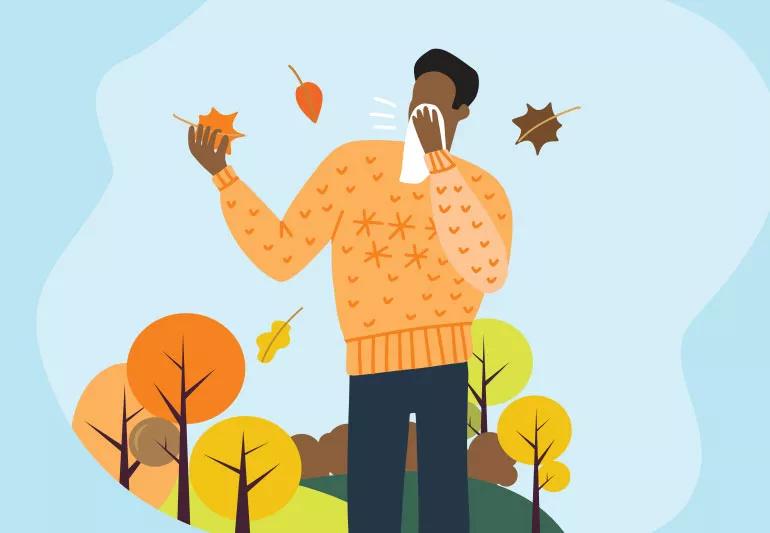
You’re stuffy and congested, your eyes are watering and your nose is running… Ah, it must be autumn! As beautiful as fall can be, it can also be agonizing if you’re prone to seasonal allergies.
Advertisement
Cleveland Clinic is a non-profit academic medical center. Advertising on our site helps support our mission. We do not endorse non-Cleveland Clinic products or services. Policy
An estimated 15% to 30% of the U.S. population is thought to have allergic rhinitis. You’re more likely to have fall allergies if you have:
“All people are different, but often, people with allergies are sensitive to multiple allergens — spring, fall and perennial,” says allergist Mark Aronica, MD. “Sometimes, though, we do see patients with only a few sensitivities or with symptoms only in one of the seasons.”
Dr. Aronica talks fall allergies, including what causes them and how to handle them.
A fall allergy goes under the category of allergic rhinitis, also called hay fever, which happens when your body’s immune system reacts to an inhaled pollen in the air. It can cause:
Allergic rhinitis encompasses seasonal allergies — those that arrive with the onset of a particular season — as well as allergies you have all year round, known as perennial allergies.
“Perennial allergens are year-round and include people who are sensitive to animal danders (like cats and dogs), as well as dust mites, cockroaches and molds, which are also considered to be year-round allergens,” Dr. Aronica explains. “Seasonal allergens include the spring and fall pollens — and spring allergens also include trees and grasses.”
It’s such a pretty season, but it’s hard to enjoy when you can’t seem to stop sneezing. So, what causes fall allergies? What is it that you’re actually allergic to?
“Fall allergens are generally weeds,” Dr. Aronica says. He breaks down some of the most common allergens during this time of year:
When do fall allergies start? The most common fall allergen is ragweed, a member of the daisy family that starts to bloom in North America in late August and lives through autumn.
Ragweed’s flowers produce significant amounts of pollen, which makes it an especially potent allergen. A single ragweed plant can release up to a billion grains of pollen.
The best way to try to prevent allergy issues is to try to stay away from the things you’re allergic to. “The mainstay of therapy is avoidance,” Dr. Aronica says.
Advertisement
But that can be difficult when you’re allergic to pollen, which blows in the crisp autumn breeze and settles on everything in its path. He explains how you can fight allergies in fall:
Though these tips will help you come into contact with less pollen, it’s just about impossible to fully avoid pollen. If you’re still sneezy, get an assist from science and hit up a drugstore or pharmacy to try an over-the-counter medication designed to relieve your allergy symptoms.
“Many allergy medications are safe and now available over the counter, including nasal steroid sprays like fluticasone and triamcinolone, and the long-acting, nonsedating antihistamines such as loratadine and cetirizine,” Dr. Aronica notes. “These medications are generally very good at managing most allergies.”
Take your allergy medicine before your allergies get bad, especially on days predicted to have high pollen counts. Local news channels and online weather websites offer pollen forecasts that can help you stay up to date.
Advertisement
If you’re doing everything you can but still can’t kick the sniffles and sneezes, it may be time to see an allergy specialist for extra help.
“We can do a skin test to identify a patient’s specific allergens and to determine if there are additional pollens or if they have a perennial allergy,” Dr. Aronica says. “If you might be interested in allergy shots, that is only something an allergist can provide.”
Allergy shots — also called allergen immunotherapy or subcutaneous immunotherapy (SCIT) — are a way to slowly decrease your sensitivity to certain allergens, which can greatly reduce your symptoms. But they’re typically a long-term therapy used only after you’ve tried everything else.
And as Dr. Aronica points out, not all runny noses are due to allergies. A skin test will also show whether you’re indeed experiencing allergies. If not, you’ll know to seek continued medical input to figure out what’s causing your symptoms.
Allergy symptoms can vary during a person’s lifetime, depending on where they live and what they’re exposed to. If your primary issues are fall seasonal allergies and then you move someplace where pollen is less abundant, you’ll probably experience a drop in symptoms when autumn comes around.
Ultimately, there isn’t a cure for allergies. But by arming yourself with preventive measures, allergy medication and pollen forecasts, you can finally enjoy autumn, rather than sneeze your way through it.
Advertisement
Learn more about our editorial process.
Advertisement

Enteroviruses are often to blame for summer colds, leading to a runny nose, sore throat and digestive symptoms

From bug bites and blisters to sunstroke and swimming safety, here’s how to stay well this season
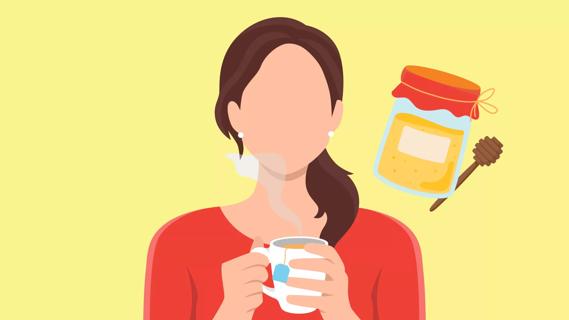
Often, a throat tickle is due to a cold, allergies or GERD — but see a doctor if it won’t go away
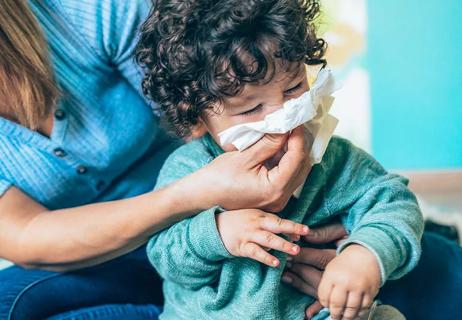
Sneezing, coughing and clear mucus shouldn’t be ignored
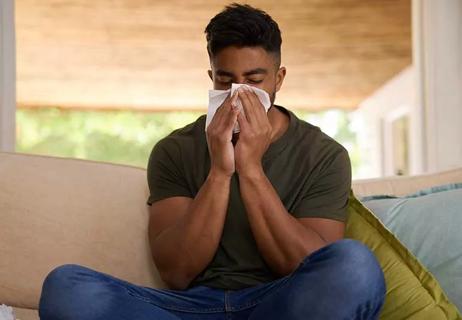
Infections like sinusitis, colds, flu and COVID-19 can cause a fever, but allergies aren’t infections
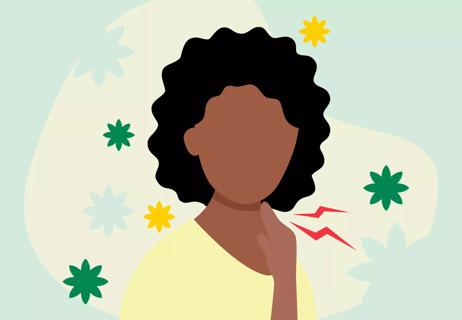
Avoid allergens when you can, and clear up phlegm with home remedies and medications
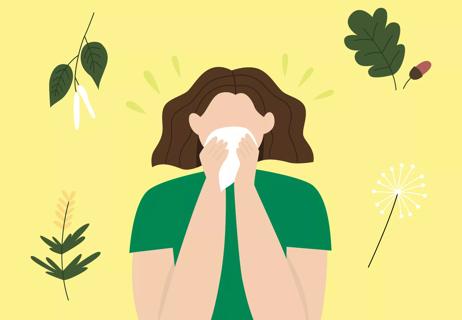
Reduce the impact of seasonal sniffles by starting your medications ahead of time

Focus on your body’s metabolic set point by eating healthy foods, making exercise a part of your routine and reducing stress

PFAS chemicals may make life easier — but they aren’t always so easy on the human body

While there’s little risk in trying this hair care treatment, there isn’t much science to back up the claims